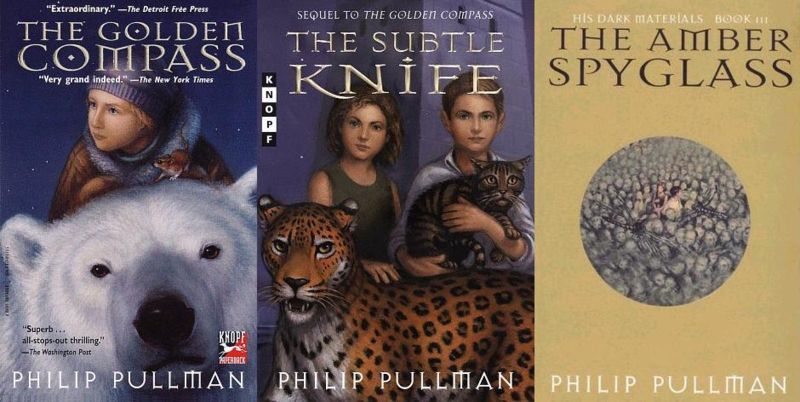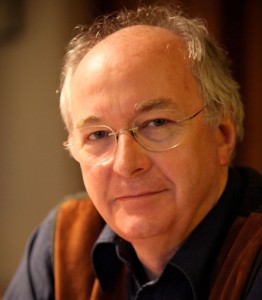“I stopped believing there was a power of good and a power of evil that were outside us. And I came to believe that good and evil are names for what people do, not for what they are.” – Dr. Mary Malone
Well, this one snuck up on me.
From September 2012 through September 2013, I decided to read fiction more aggressively than I ever had before. I finished 52 novels in 52 weeks. (Why yes, it was a “coincidence” that those novels got shorter and shorter as the year went on…)
I picked up The Golden Compass, the first book in His Dark Materials trilogy, expecting a fun children’s fantasy tale featuring magic and talking animals. What I got was an intensely cinematic and philosophical masterpiece… featuring magic and talking animals.
Still, I consider The Golden Compass one of the best books I’ve ever read, and the following books in the series — The Subtle Knife and The Amber Spyglass — aren’t far behind it. Philip Pullman reveals himself to be incredibly smart and inventive, turning cliches of the fantasy genre upside down and repositioning fantasy as starkly atheistic where so many sagas are about learning to trust the one true god/magic.
The series also has the benefit of having world-class audiobooks — narrated by the author, with a full voice cast dozens — and crossing my path at the peak of my audiobook consumption. Heck, these audiobooks were so good that I’d spend my lunch break sitting in my car in the parking lot listening, lunch cradled on my lap.
(The series is so full of twists and characters that I’m not going to attempt to summarize it all, but I will discuss some plot points, so I want to issue a SPOILER WARNING for the rest of this article.)
His Dark Materials centers around Lyra Belacqua, an unusual child who lives a semi-supervised life as an orphan at a college in a fantasy world that’s an alternate universe of ours. In this universe, people have a “dæmon” — a speaking animal that accompanies you everywhere as your complement and best friend.
[pullquote]Over the span of the three novels, her quest evolves from a journey to save her friend Roger to a multi-world battle[/pullquote]Over the span of the three novels, her quest evolves from a journey to save her friend Roger to a multi-world battle of which she’s at the center. The story is a struggle between those who despise sin because it’s evil and those who embrace it as a symbol for humanity’s free will — and while a normal story might side with the former, His Dark Materials is definitely in the latter’s camp.
The plot rises to astronomical scale, with characters literally taking on God and the afterlife. I’m always hesitant to use this word, but the stakes of the story escalate to truly EPIC levels of conflict and tension. This is just a fantastic, towering behemoth of a story.
The books’ cast sprawls larger and larger as the series go on, so it’s amazing how real and nuanced each character is, from the angels to the talking polar bears to the embattled politicians.
All of the main characters are great, but it starts with the heroine, Lyra “Silvertongue” Belacqua. If there is a greater heroine in the history of fantasy, I’m not familiar with her. Brave, passionate, clever, and wild, you’ll always be rooting for Lyra as she enters adolescence.
But the addition of Will in the second book was an inspired choice, as was setting part of the book in our world instead of Lyra’s alternate Earth. Will is similar with Lyra in just enough ways to make their friendship believable, and he adds a much-needed companion character.
Beyond the two main protagonists, His Dark Materials has an incredible stable of prominent characters. There are Lord Asriel and Mrs. Coulter who are at the center of story nearly as much as Will and Lyra, and the Gyptians from the first book are sorely missed in the later iterations.
But if you had to pick to the two most memorable characters other than Will and Lyra, you’d have to pick armored bear Iorek Byrnison and balloon-piloting cowboy Lee Scoresby.
Iorek is just such a unique character. He’s an outcast from his people, and an outcast from the rest of the world, but not the plucky, lovable kind. He’s a stubborn pillar who everyone except Lyra fails to penetrate and understand. In turn, their tenuous friendship is among the most satisfying in the series.
Lee Scoresby, meanwhile, is a fringe character in the first novel before taking center stage in The Subtle Knife. He steals every scene and moment he’s a part of, and his death scene is one of my favorite from any story I’ve ever experienced.
As much as the rich characters and complex plot, it’s the thematic backbone of the story that drives His Dark Materials to greatness. No story I’ve ever experienced has explored coming of age quite this way. The characters of Lyra’s world — particularly the members of church and higher education — view wrongdoing as an inevitable, scientific truth that they can cure much the way we cure polio.
The conflict of the series is driven by ostensibly good people who seek to rid the world of evil — but have to commit evil to do so. This is a bit of cliche, but the way it unfolds in the world of His Dark Materials is anything but cliche. Pullman’s world is about a struggle to eradicate original sin at the expense of humanity, not by evil tyrants but by wise mentors.
[pullquote]It’s a tremendously deep and thoughtful series[/pullquote]. Pullman never panders, and he adds extra layers to the typical ethical struggles of fantasy.
There was a strong backlash from Christian groups against His Dark Materials. Through the first two books, I wasn’t shocked, but I thought these objections were ridiculous. All of the religious figures in the book prove hypocritical or frail before the end of the series — but the book seems an objection to HYPOCRISY more than religion.
By the time I finished The Amber Spyglass, I actually felt like some of the Christian objection was justified. A chapter late in the saga includes an extended rant from Lyra essentially pitching atheism. It feels shoved down your throat for that stretch — but only the last quarter of The Amber Spyglass.
My next-biggest objection is the slow start of Subtle Knife. After the roaring conclusion to Compass, it takes almost half of the middle entry to really build up momentum again. From there, the story never looks back.
These are only minor mark against the series. The entire story holds together so well that the objections fade into the background. All of Golden Compass, the second half of Subtle Knife, and the first three quarters of Amber Spyglass are pretty much flawless, remarkable storytelling — and the rest is only minorly flawed.
His Dark Materials is really just fantastic and timeless and intensely thoughtful, one of my favorite book series I’ve ever read.







